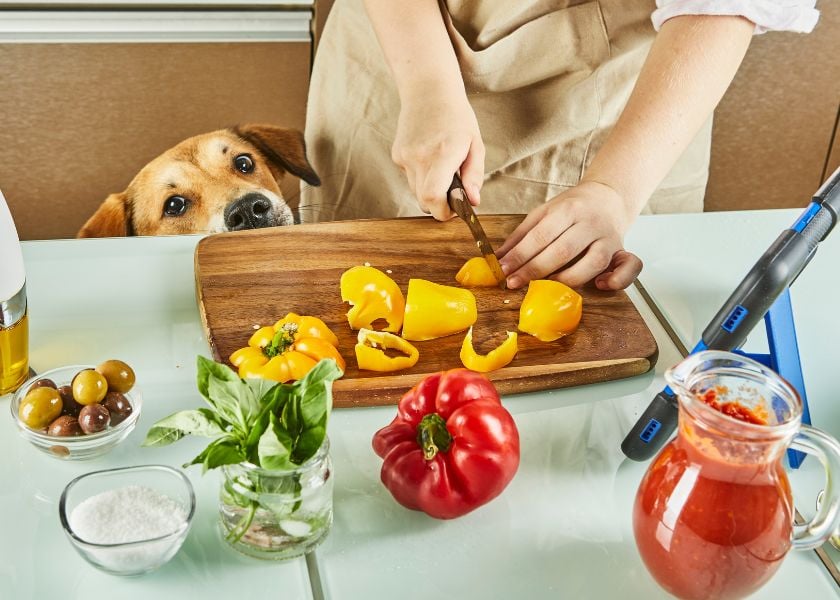
As dog owners, we want the best for our furry friends. Their health and well-being are of utmost importance to us. When it comes to their nutrition, the debate between commercial dog food and home-cooked meals has been ongoing. Home-cooked meals for dogs have gained popularity in recent years, with proponents touting the benefits of fresh ingredients and customized recipes. However, there are also concerns about the potential pitfalls of preparing homemade meals for dogs. In this article, we will explore the topic of home-cooked meals for dogs, examining whether they are a nutritious alternative or a potential pitfall.

The Benefits of Home-Cooked Meals for Dogs
Improved Quality of Ingredients
One of the primary arguments in favor of home-cooked meals for dogs is the ability to control the quality of ingredients. Commercial dog foods often contain fillers, by-products, and artificial additives that may not provide optimal nutrition for our dogs. By preparing meals at home, dog owners can choose high-quality ingredients such as lean meats, fresh vegetables, and whole grains, ensuring that their dogs receive the best possible nutrition.

Customized Diets for Specific Needs
Another advantage of home-cooked meals is the ability to tailor the diet to meet the specific needs of individual dogs. Some dogs have dietary restrictions or sensitivities that cannot be adequately addressed by commercial dog foods. For example, a dog with food allergies may require a diet free of common allergens such as wheat or soy. With home-cooked meals, dog owners have the flexibility to create recipes that cater to their dog's unique nutritional requirements.

Bonding and Engagement
Preparing home-cooked meals for dogs can be a bonding experience for both the dog and the owner. It allows for increased engagement and interaction, as the dog observes the cooking process and eagerly awaits their delicious meal. This shared experience can strengthen the bond between the dog and the owner, fostering a sense of companionship and trust.

Potential Pitfalls of Home-Cooked Meals for Dogs
Nutritional Imbalance
While home-cooked meals offer the opportunity for better ingredient control, there is a risk of nutritional imbalance if the meals are not properly formulated. Dogs have specific dietary requirements that need to be met to maintain their health. Without a proper understanding of these requirements, homemade meals may lack essential nutrients or contain an excess of certain components. It is crucial to consult with a veterinarian or a veterinary nutritionist to ensure that homemade meals are nutritionally balanced and meet the dog's specific needs.

Time and Effort
Preparing home-cooked meals for dogs requires a significant investment of time and effort. It involves planning, sourcing ingredients, cooking, and portioning meals. For busy dog owners, this can be a daunting task that may not be sustainable in the long run. It is essential to consider one's lifestyle and schedule before committing to home-cooked meals for dogs.

Risk of Contamination
Another potential pitfall of home-cooked meals is the risk of contamination. Handling raw ingredients, such as raw meat or eggs, can pose a risk of bacterial contamination, which may lead to foodborne illnesses in dogs. It is crucial to follow proper food safety practices, including thorough cooking and hygiene protocols, to minimize the risk of contamination.

Home-cooked meals for dogs can be a nutritious alternative when done correctly. They offer the benefits of improved ingredient quality, customized diets, and enhanced bonding with our furry friends. However, it is important to be aware of the potential pitfalls, such as nutritional imbalances, time constraints, and the risk of contamination. Consulting with a veterinarian or a veterinary nutritionist is crucial to ensure that homemade meals meet the specific nutritional needs of dogs. By striking a balance between the benefits and potential challenges, dog owners can provide their furry companions with wholesome and nourishing meals.

The Benefits of Home-Cooked Meals for Dogs
Improved Quality of Ingredients
One of the primary arguments in favor of home-cooked meals for dogs is the ability to control the quality of ingredients. Commercial dog foods often contain fillers, by-products, and artificial additives that may not provide optimal nutrition for our dogs. By preparing meals at home, dog owners can choose high-quality ingredients such as lean meats, fresh vegetables, and whole grains, ensuring that their dogs receive the best possible nutrition.

Customized Diets for Specific Needs
Another advantage of home-cooked meals is the ability to tailor the diet to meet the specific needs of individual dogs. Some dogs have dietary restrictions or sensitivities that cannot be adequately addressed by commercial dog foods. For example, a dog with food allergies may require a diet free of common allergens such as wheat or soy. With home-cooked meals, dog owners have the flexibility to create recipes that cater to their dog's unique nutritional requirements.

Bonding and Engagement
Preparing home-cooked meals for dogs can be a bonding experience for both the dog and the owner. It allows for increased engagement and interaction, as the dog observes the cooking process and eagerly awaits their delicious meal. This shared experience can strengthen the bond between the dog and the owner, fostering a sense of companionship and trust.

Potential Pitfalls of Home-Cooked Meals for Dogs
Nutritional Imbalance
While home-cooked meals offer the opportunity for better ingredient control, there is a risk of nutritional imbalance if the meals are not properly formulated. Dogs have specific dietary requirements that need to be met to maintain their health. Without a proper understanding of these requirements, homemade meals may lack essential nutrients or contain an excess of certain components. It is crucial to consult with a veterinarian or a veterinary nutritionist to ensure that homemade meals are nutritionally balanced and meet the dog's specific needs.

Time and Effort
Preparing home-cooked meals for dogs requires a significant investment of time and effort. It involves planning, sourcing ingredients, cooking, and portioning meals. For busy dog owners, this can be a daunting task that may not be sustainable in the long run. It is essential to consider one's lifestyle and schedule before committing to home-cooked meals for dogs.

Risk of Contamination
Another potential pitfall of home-cooked meals is the risk of contamination. Handling raw ingredients, such as raw meat or eggs, can pose a risk of bacterial contamination, which may lead to foodborne illnesses in dogs. It is crucial to follow proper food safety practices, including thorough cooking and hygiene protocols, to minimize the risk of contamination.

Home-cooked meals for dogs can be a nutritious alternative when done correctly. They offer the benefits of improved ingredient quality, customized diets, and enhanced bonding with our furry friends. However, it is important to be aware of the potential pitfalls, such as nutritional imbalances, time constraints, and the risk of contamination. Consulting with a veterinarian or a veterinary nutritionist is crucial to ensure that homemade meals meet the specific nutritional needs of dogs. By striking a balance between the benefits and potential challenges, dog owners can provide their furry companions with wholesome and nourishing meals.



